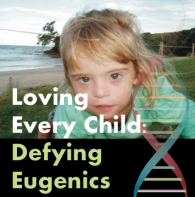Updating the war on the weak…

In a 2007 column, George Will described the use of prenatal screening for Down syndrome babies as a search-and-destroy mission. His assessment was correct then and is ever more apt today. Over 70 percent of Down babies are aborted in the United States. In Taiwan, it is even higher — 94 percent.
New methods of prenatal testing have already shown an increase in abortions following a positive test for Down syndrome. These tests are less invasive and more accurate—and thus more attractive.
But they are not foolproof. Michael Greene, an OB-GYN at Massachusetts General Hospital in Boston, worries that without a proper understanding of the tests “women may use a positive screening test as the basis for terminating what would actually have been a normal pregnancy.”
J. D. Flynn, writing for the blog First Thoughts, shows how this plays out in the case of Down syndrome (trisomy 21), which can be confirmed.
With prenatal certainty about trisomy 21, the doctors said, women won’t accidentally abort normal children.
The assumption of that logic, of course, is that any rational woman would choose to abort a child with Down syndrome.
Flynn goes on to reflect on what it means to be “abnormal” in a technological society where “paradise is only a problem of engineering.”
I have two “abnormal children,” both of whom were born with Down syndrome. Both are adopted. Both were born to brave women counseled to abort their “abnormal pregnancies.” Their stories are far too typical. Prenatal testing is the reason why more than 70 percent of American children conceived with Down syndrome are aborted.
I’m not naïve about the challenges parents face when children have a disability. My children are significantly delayed. They undergo programs of extensive physical and occupational therapy. My daughter was born just a year ago, and is already facing her second bout with leukemia. Parenting disabled children is hard, and anyone who says otherwise is dishonest.
Yet children like mine spread a kind of joy that begins with their own unflappable optimism. I don’t know why children with Down syndrome, and other profound medical conditions, are this way. But I know that they are. And that we’re in danger of losing their joy because we’ve largely replaced moral reasoning with technocratic idealism.
By their very nature, technocracies work towards the path of least resistance: towards creating systems with fewer exceptions, aberrations, or deviations. Technocrats think in matrices, and exceptions to the norm are viewed as problems to be solved. If children with disabilities spoil the mathematical predictability of the technocratic utopia, they must be eradicated from the equation. Eugenics makes perfect sense when paradise is only a problem of engineering.
My children are deviations from the norm. They’re disruptive. They’re sometimes loud, and they process information slowly. They require special attention, and patience, and tolerance. But it is worth paying attention to children like mine. They’re extraordinary, in their own right. And they remind us that happiness can’t be engineered through the ever-broadening possibilities of technology, or the ever-reaching arm of social policy. Happiness is relational. So is Paradise. However we understand salvation, it’s worked out in relationships—to one another, and to the divine.
Abnormal people are not the exception to the rule, or the flaw in the system. Abnormal people are the norm. We’re all the abnormal children of God. If we can rejoice in our own abnormality, we might just save those who point the way to Paradise.
Attorney Mark Leach has written a very helpful update on recent technical developments in the area of genetic screening. In “Top developments in Down syndrome prenatal testing for 2013” he points out that prenatal screening is increasingly part of the standard protocol for expectant mothers, not just for those considered to be “high risk” for carrying a baby with a fetal abnormality. And he predicts the same expansion of testing for other abnormal genetic conditions as screening tests become available.
“NPR’s Disturbing Prenatal Testing Story,” by J. D. Flynn, is available here.


 March 6, 2014
March 6, 2014 







We were told my daughter had downs. It was a false positive on the fetal alpha protein test. We didn’t know it was a false postive until she was born.